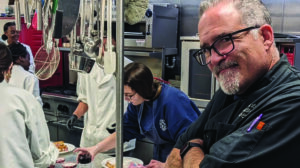For trendy urbanites, the ìlocavoreî movement is a recent fad that focuses on purchasing regionally grown produce and meat. For many Falcon and Eastern El Paso County residents, it’s called ìeating.î Community Supported Agriculture, farm shares and beef shares are becoming mainstream ways to eat healthier and support local farmers.CSA farms sell shares of their production to local families who pick up their allotment of fresh fruits, vegetables, eggs and other produce each week or month during the growing season. The number of shares sold depends on the size of the farm. The cost is sometimes offset by the consumer helping with labor on the farm during work days.ìThe CSA model is getting a lot of play in the media and a lot of interest,î said Christine Faith, who runs Ivywild Farm with her husband. ìWe’re a very small, one-to-three share CSA. We actually prefer the term Neighborhood Shared Agriculture, where we can walk food to neighbors. Zero carbon instead of low carbon.îThe ability to have food grown within oneís home-based area has health benefits in addition to environmental benefits, said Stephen Kutscher, Falcon chiropractor. ìI love the variety of food that grows on the Front Range compared to what you get in the grocery store,î Kutscher said. ìI like being able to talk directly to the farmer growing my food about the processes theyíre using. Consuming local raw milk and honey can also help with some allergies.î The variety of produce included in farm-share baskets also challenges consumers to try new foods that provide more nutrients. ìSometimes, I’ll get my box and say ëwhat the heck is this?í Then I get to look up how to cook it, and try new dishes,î Kutscher said.ìI try to avoid giving our family anything with lots of antibiotics or growth hormones,î said Lindsey Mote, who uses an east county grower for her family’s protein needs. ìFactory farmed beef is gross, and the animals live in awful conditions. Where I get my beef share I can go to the farm and point out the cow that will be our ground beef and steaks later, and see that it’s being treated well and is healthy.îGrass-fed pastured beef is also available at specialty stores such as Whole Foods. However, the cost of specially grown protein is prohibitive to some families. ìSure, you can order it from the specialty shops, but we wanted to support local agriculture,î Mote said. ìIt’s also much cheaper. A share of a cow runs about $4.25 per pound across the board for even the best cuts, versus $11.99 per pound at Whole Foods.îThe CSA model is in critical danger from increasing regulations and liability issues, Faith said. ìThe FDA passed some reforms called ‘Seed-to-Table,’ where they are demanding increased tracking, paperwork and costs,î she said. ìThe FDA ignored Congress’s direction to exclude the smallest local farms, and there are hearings about it coming up.îCSA farm shares are advertised through websites such as http://coloradocsas.info, which lists participating farms by farm location or share pickup sites.New farms are starting each year, as consumers begin seeing the benefit of cost and nutrient density, Kutscher said. ìMy goal is to eventually do it myself,î he said. ìI want to be able to grow all sorts of organic produce and provide high nutrient organic foods to people that otherwise wouldn’t be able to afford it.î






